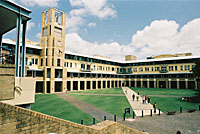|
|||||||||||
| Linguistics | |||||||||||

Linguistics is the study of human language. Its practitioners address questions such as: How do people use language in various situations? What is the biological basis for language? Is language unique to the human species? How and why do languages change? How do children learn language? What is the meaning of 'meaning'? Can machines talk?
Linguistics also provides a basis for a variety of practical applications, including the teaching and learning of foreign languages, translating and interpreting, facilitating cross-cultural communication, diagnosing and treating language disorders, providing linguistic support for such professions as law and medicine, developing language curricula in schools, improving literacy skills, generating speech by computer, producing 'plain English' documents, and so on. Studying Linguistics at UNSW The study of Linguistics at UNSW is primarily through the School of Languages and Linguistics. At an undergraduate level, Linguistics is offered as a major sequence within the Bachelor of Arts and related combined degree programs. An Honours year is also available to high achieving students. Postgraduate research and coursework programs are also available.
Linguistics can be studied as
|
|||||||||||



